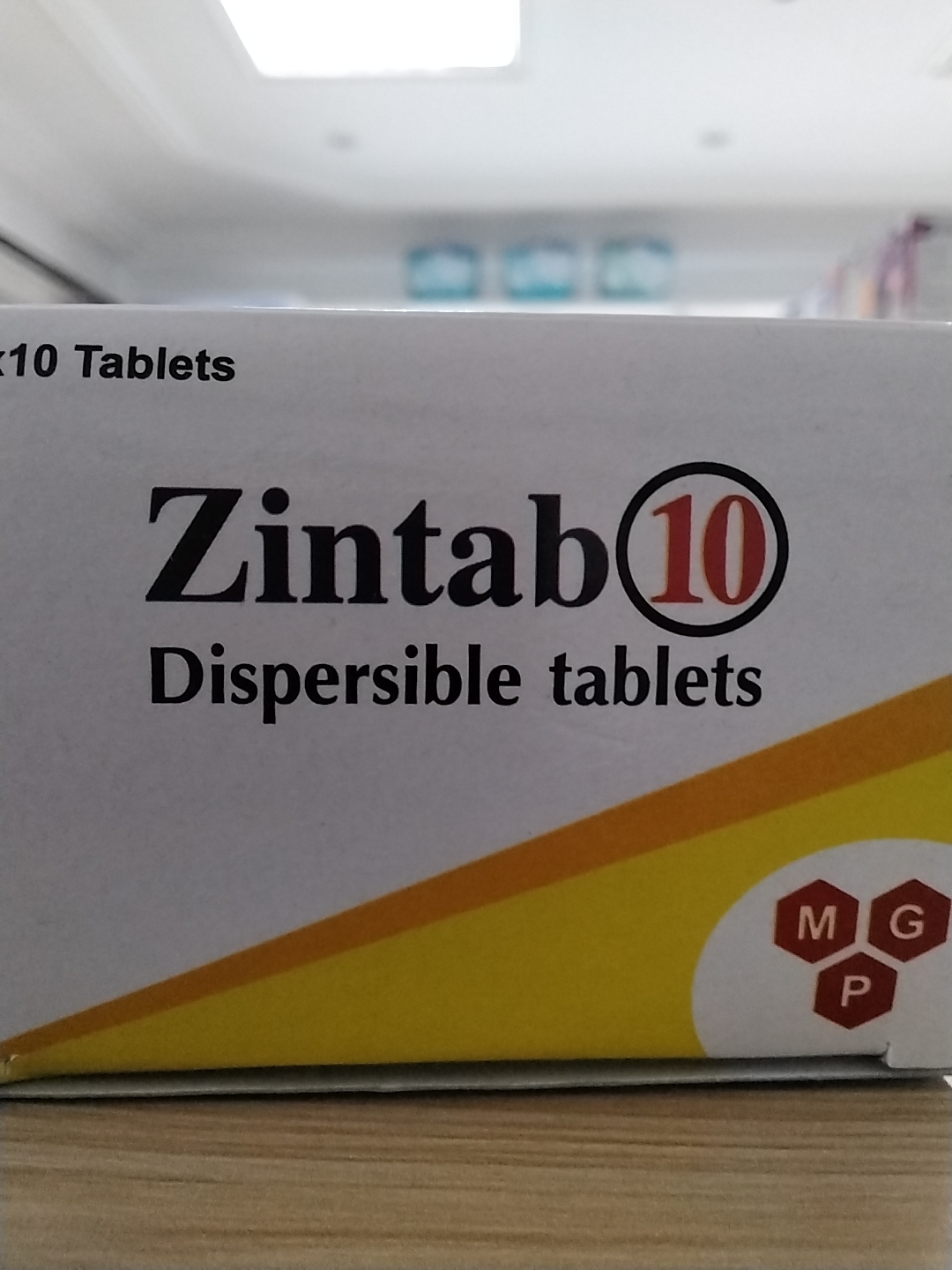Composition:
- Zintab 10: Each dispersible tablet contains Zinc 10 mg (as Zinc sulphate monohydrate).
- Zintab 20: Each dispersible tablet contains Zinc 20 mg (as Zinc sulphate monohydrate).
List of Excipients:
- Zintab 10: Dibasic calcium phosphate, Talc, Maize starch, Colour tartrazine yellow, methyl paraben sodium, colloidal silicon-dioxide, Magnesium stearate, saccharin sodium, sweet orange powder.
- Zintab 20: Dibasic calcium phosphate, Talc, Maize starch, Colour sunset yellow, methyl paraben sodium, colloidal silicon-dioxide, Magnesium stearate, saccharin sodium, sweet orange powder.
Indications:
Zinc salts are used as supplements to correct zinc deficiency; for example, in malabsorption syndromes. Also used as an adjunct for the treatment of diarrhoea in children.
Side Effects:
The most frequent adverse effects of zinc salts given orally are gastrointestinal and include abdominal pain, dyspepsia, nausea, vomiting, diarrhoea, gastric irritation, gastritis and lethargy. These are particularly common if zinc salts are taken on an empty stomach and may be reduced by giving them with meals.
Overdosage:
Acute overdosage of zinc salts are corrosive, due to the formation of zinc chloride by stomach acid; treatment consists of giving milk or alkali carbonates and activated charcoal. The use of emetics or gastric lavage should be avoided. High serum zinc concentrations may be reduced by using a chelating drug such as sodium calcium edetate.
Caution and Precaution:
Accumulation of zinc may occur in case of renal failure.
A case of reversible cytopenia associated with excessive zinc supplementation. Patients having history of hypersensitivity with Zinc.
Contra-indications:
Patients having history of hypersensitivity with Zinc.
Interactions:
The absorption of zinc may be reduced by iron supplements, penicillamine, phosporus-containing preparations, and tetracyclines.
Zinc supplements reduce the absorption of copper, Calcium, fluoroquinolones, iron, penicillamine, and tetracyclines.
Pharmacokinetics and Pharmacodynamics:
Zinc is an essential trace element involved in many enzyme systems, it is absorbed from the gastrointestinal tract and distributed throughout the body. Absorption of zinc from the gastrointestinal tract is incomplete and is reduced in the presence of some dietary constituents such as phytates. Bioavailability of dietary zinc varies widely between different sources but is about 20 to 30%. Zinc is distributed throughout the body with the highest concentrations found in muscle, bone, skin, eye and prostatic fluids. It is primarily excreted in the faeces, and regulation of faecal losses is important in zinc homeostasis. Small amounts are lost in urine and perspiration.
Pregnancy and Lactation:
Zinc requirements are increased in pregnancy. Although it is unclear to what extent this has clinical consequences, some have suggested that supplementation with modest doses of zinc (less than 45 mg daily) during pregnancy may have beneficial effects on fetal growth and development, and lead to improved pregnancy outcomes.
A controlled study in Peru found that addition of oral zinc to iron and folate supplementation improved fetal bone growth, as measured by femur length.
An earlier systematic review found that although zinc supplementation may have resulted in a lower rate of induction, preterm delivery, and caesarean section, there was no evidence of an overall benefit in all women; benefits may be restricted to groups whose diet is likely to be deficient.
In the UK the reference nutrient intake (RNI) for values are also given for infants and children of varying ages and for lactating women.
Dosage:
In deficiency states, zinc is usually given orally as the sulfate or the sulfate monohydrate, in doses of up to 50 mg of elemental zinc three times daily. The usual adult dose is 50 mg three times daily up to a maximum of five times daily.
- Children from 1 to 6 years may be given 25 mg twice daily.
- 6 years to 16 years and with a body-weight under 57 kg are given 25 mg three times daily.
- Adolescents from 16 years of age, or with a body weight above 57 kg are given 50 mg three times daily.
Use in Diarrhea:
Chronic diarrhea can be a sign of zinc deficiency, and diarrhea can lead to excessive zinc losses and zinc deficiency when dietary zinc is inadequate. Zinc supplements have been shown to reduce the incidence, intensity, or duration of acute diarrhea.
- Children above 6 months: 20 mg daily for 10-14 days.
- Children below 6 months: 10 mg daily for 10-14 days.
Presentation:
- Zintab 10: 1 x 10 tablets of blister.
- Zintab 20: 1 x 10 tablets of blister.
Shelf Life:
- Zintab 10: 3 years from the date of manufacture
- Zintab 20: 3 years from the date of manufacture
Storage:
Store in a cool and dry place, not above 30°C.
Keep out of the reach of children.
Date of publication: January 2010.
Manufactured in Ghana by:
M & G Pharmaceuticals Ltd, D 446/1, Bannerman Road, James Town, Accra.
